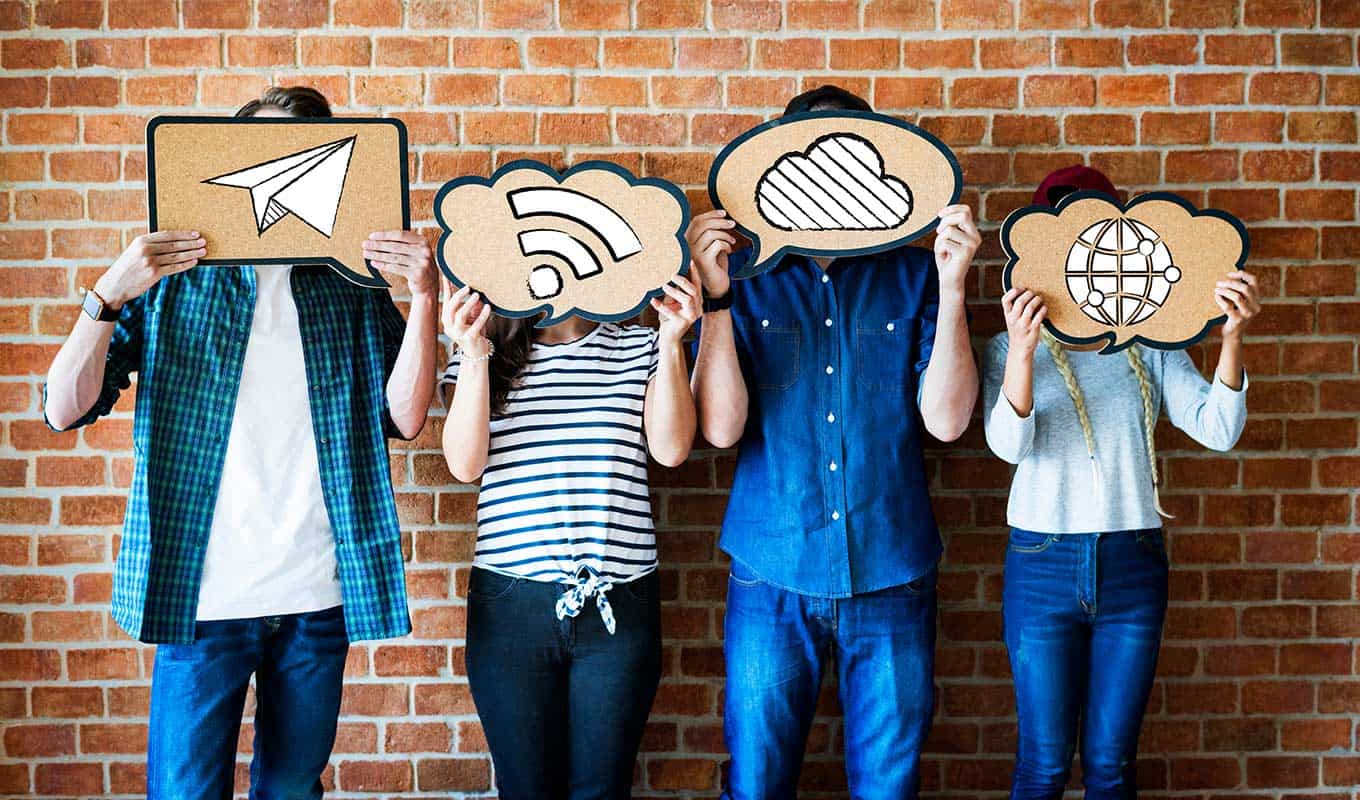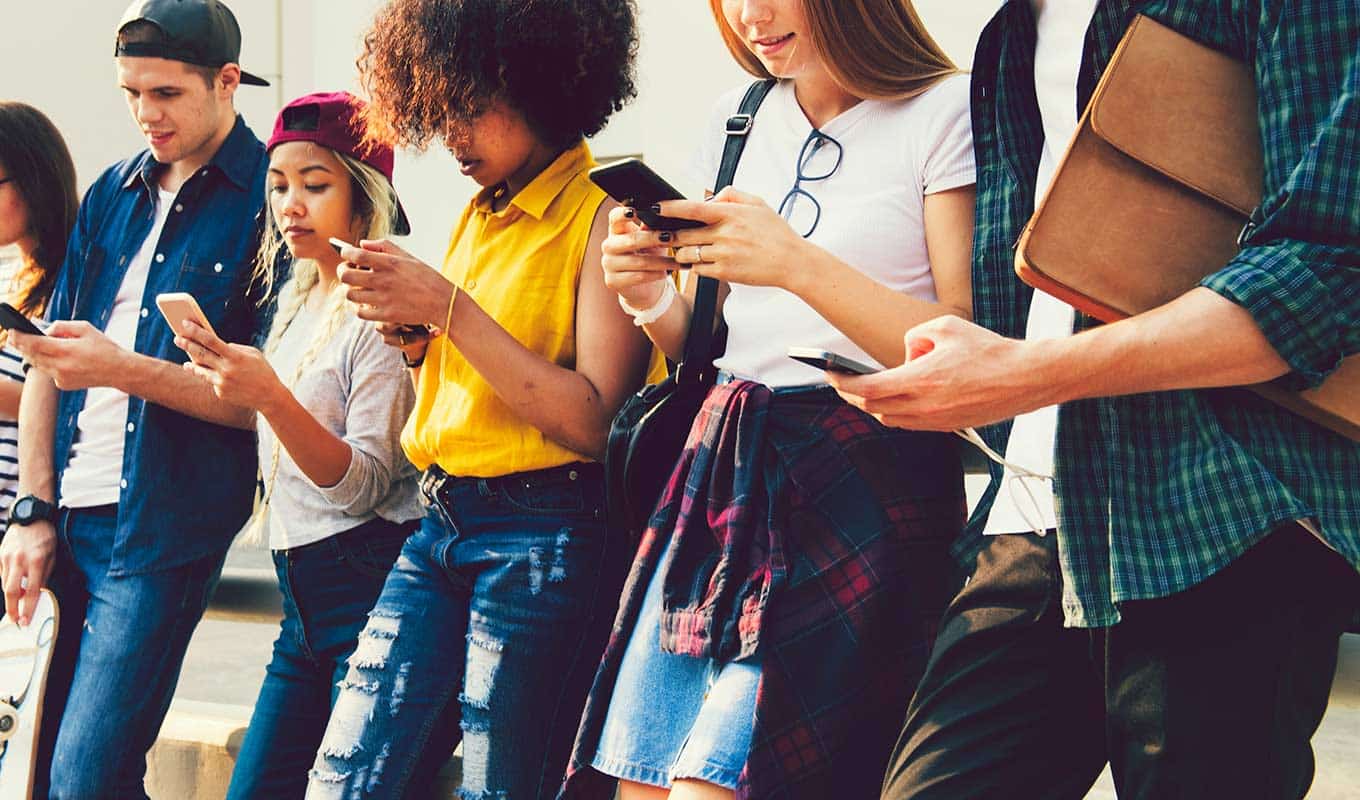Gen Z Loneliness: Why We Need To Unplug And Reconnect

If you are part of Gen Z, you’re probably asking yourself, “Why is Gen Z so lonely?” — and if you blame it on the internet, well, you might be (at least partly) right.
- Gen Z is more prone to addictive tendencies and behaviors, which can include being online and using social media, compared to older generations.
- Social media and technology have had the most profound effect on the amount of loneliness experienced by those who belong to Gen Z.
- Unplugging from the online world and being present with friends and family can help alleviate Gen Z loneliness.
Struggling with loneliness or having a mental health crisis?
- Suicide Prevention Lifeline: 1-800-273-TALK (8255); Deaf or hard of hearing dial 711 before the number or connect via online chat
It’s no wonder some have labeled Gen Z as the loneliest generation.
Born between 1997 and 2012, Generation Z was one of the first and youngest generations to grow up on the internet.
We were children and teens navigating life in a tech-driven “wild west,” with screens separating us from our peers.
The rise of technology during this period spurred a dramatic and lightning-fast shift in the way that humans communicate and connect on a daily basis.
Social media sites are extremely overstimulating, flooding our brains with information and news all the while furthering current notions of social hierarchy and celebrity.
While other generations may remember playing real guitar or tennis in their free time, Gen Z played Guitar Hero and Wii Tennis.
Previous generations had fights and friend drama in person as teenagers; Gen Z experienced much of the same, largely through social media accounts.
That isn’t to say technology, the internet, and social media are all negative or even bad; it’s really nice to exist in a world with so much entertainment readily available.
Though it has its drawbacks, we all still reap the many benefits that the internet provides us.
I do, however, wonder if Gen Z experiences so much loneliness because we are products of growing up in this environment.
What Is Gen Z Loneliness And How Is Modern Tech To Blame?

If you belong to a different generation, you may be wondering, “Is Gen Z lonely?”
It’s no secret that the COVID-19 pandemic brought about an increase in loneliness and for many, depression, as well.
As a member of Generation Z myself, I can attest to feeling extremely lonely during the pandemic years — and beyond.
The onset of attending school or work over Zoom caused most of us to reconfigure the way that we connect with others daily.
But Gen Z’s loneliness goes deeper than that.
Generation Z is as lonely as the elderly if not more, but for different reasons.
Gen Z loneliness may arise from:
- Over-consuming technology that includes television, YouTube, TikTok, Facebook, and other social media
- Comparing oneself to others on social media
- Feeling inadequate from a developmental standpoint, as though our peers are achieving more than we are
- Going to school virtually or working from home
- Living away from family or moving to a new city to start a career or attend college
- Living alone — especially if it’s your first time doing so
- Being single or feeling like you’ll never find a soulmate, and having less sex as a result
- Feeling a lost sense of direction, or not being sure of what to do with your life
I spoke to Grace, an ex-social media influencer who identifies as Gen Z, about her experience with loneliness and TikTok.
She had much to say on the topic, and with seven months of separation from the app as of this writing, says she now feels more centered and at peace.
When Grace first downloaded TikTok, she primarily used the app to watch videos, lingering on other girls’ accounts that she found interesting.
Among these, she gravitated toward aesthetic videos of girls going through their day and showing the interiors of their apartments.
After some time as a “lurker” on the app, Grace decided to post a video of her own, mimicking the style of other videos she admired.
Shortly after posting a few videos, Grace started gaining traction as an influencer on the app, gathering more views, likes, and followers each day.
“When I blew up on TikTok, I was so happy about it but then it quickly became so pointless,” she explained. “It was addicting, though.”
“I got so attached to the likes and people commenting and stuff,” she told me. “When I wouldn’t do as well on a video, I would just totally spiral and feel terrible about myself.”
It wasn’t long before Grace discovered the dark side of social media addiction.
“I would watch other people’s videos and get those ten seconds of dopamine and then just need more,” she explained.
“On top of that, posting my own videos and needing other people to say stuff about it was like getting a fake version of human connection or something,” she observed.
“I was in denial about how much it was actually causing harm to my mental health.”
She continued:
“In the beginning, it was so exciting and fun, getting all of this virtual attention, but then it took a turn and I realized that I felt a constant pressure in my chest, so much anxiety I didn’t even know what to do with it.
I would watch other people’s TikToks and just feel awful about myself.
I was just constantly comparing myself to others and wishing that things were different about my body, living situation, friends, lack of boyfriend, etc.”
She told me that in a way, watching others’ TikTok videos made her brain focus on all the things she didn’t have, which made her feel more lonely in the end.
Since Gen Z remains in its youth and our young-adult brains are still developing, we’re more prone to addictive tendencies and behaviors in general.
This is especially true when it comes to technology and entertainment, not to mention the ease with which we can all access it.
Like all other addictive things, binging on TikTok, YouTube, or other social media might feel really great at the moment, but it can leave you feeling empty, lost, and lonely.
Internet addiction is a real thing that affects many different people of all ages. It is notable, however, that 99% of people between the ages of 18 and 29 use the internet.
This 2018 study surveyed women between the ages of 18 and 25 about the effects that Instagram has on body image and self-objectification.
It found that “Greater overall Instagram use was associated with greater self-objectification, and that relationship was mediated both by internalization and by appearance comparisons to celebrities.”
Given that 84% of adults aged 18 to 29 use social media, I think it’s a fair argument to say that there is a very strong and undeniable correlation between Gen Z loneliness and social media use.
The question is: What can we do about it?
Although loneliness can arise for a variety of situational reasons including living away from home, attending college, or struggling to find your direction in life, much of the loneliness experienced by those belonging to Gen Z likely stems from constant social media use and an addiction to technology.
How To Unplug And Cope With Gen Z Loneliness

Gen Z loneliness may feel neverending, especially if you’re someone who spends a lot of time on your phone or computer.
I get it.
Sometimes it feels like our veins are directly hardwired into modern technology. It’s all we’ve ever known.
Older generations that came before us often poke fun at our reliance on tech and in some ways, it’s understandable.
Those folks played outside all day as children and their televisions only had 3 channels, while we grew up with the entire world at our fingertips — literally.
We need to find ways to tune out and connect — without our devices.
It might seem difficult, if not impossible, but putting technology away is one of the best methods to overcome Gen Z Loneliness.
Delete your social media:
Deleting social media, or even doing a “social media detox” is a surefire way to stop comparing yourself to others, but it also forces you to build (and maintain) more connections in person.
When I first deleted my social media accounts, I had a very hard time resisting the urge to download the apps again and let myself scroll aimlessly.
I didn’t realize how much of a habit it had actually become until I actively took steps to stop using it.
Things got much easier over time and eventually, I realized how many hours I’d been wasting scrolling through Instagram and Facebook.
Especially if you’re Gen Z and have never experienced life without social media, I highly suggest challenging yourself to a social media cleanse.
I know it’s difficult.
I wasn’t kidding when I said it sometimes feels like our veins are hardwired into our technology.
The thing to remember is this: Social media is not an essential part of life. It isn’t like air, water, or food.
Life will go on — with or without those apps.
I promise.
Make plans to see friends and family in real life (IRL):
Especially if you’ve spent too much time on social media, making specific “in real life” plans with friends and family is a great way to get some face-to-face connection.
Humans are social creatures. Being with friends and family is an integral part of being alive.
But how do you connect with others if you’re not on social media?
Do what they did in the olden days!
Pick up the phone and call them to make plans. Send a text, even.
You might even just go for a walk and drop by unannounced — but only if they’re the type of people who don’t mind surprise visits.
People got together in person long before the age of social media, smartphones, apps, or other technologically-driven means.
It’s easy to rely on technology — for everything — but you truly don’t need it to spend time with others in person.
The same goes for dating.
Although many people use dating apps, Gen Z is having less sex compared to previous generations and the lack of social interaction may be (partly) to blame.
Journal to share your experiences — with yourself:
If you’re used to sharing your day-to-day life on social media but you’ve unplugged, journaling and scrapbooking are great ways to fill the void.
By “sharing” your activities, thoughts, and photos in a scrapbook or journal, you can log your experiences in a way that gives you something to reference whenever you want to remember them.
The bonus? You’ll be keeping that record for yourself.
People post on social media all the time to talk about their day, their thoughts about the world, their likes, dislikes, and any other aspect of their life that holds significant meaning to them at the moment.
But it’s always done under the assumption that others will be reading those words.
You’re living your life for you — not for the entertainment of others.
Keeping a journal or scrapbook will allow you to record your thoughts, feelings, and memories in a way that’s honest, more meaningful, and for your eyes only.
It’ll give you the means to reflect on your own life experiences, work through your emotions, thoughts, or concerns, and serve as a record of a life well-lived — something we all aspire to have.
Unplugging from your phone and computer and spending in-person time with friends and family can help alleviate Gen Z’s loneliness. Even though it seems like a hard thing to do, there are many benefits to taking a break from social media — or deleting it entirely.
Closing Thoughts
Loneliness is felt by all generations.
It’s something that people have experienced before us and will continue to face long after we’re gone.
An overindulgence in social media may be a major contributor to the reason why Gen Z experiences so much loneliness, but that doesn’t mean it has to completely shape our way of life.
By unplugging from social media — or deleting it completely — we can reclaim our sense of connection with others in a deeper and much more meaningful way.
Editor’s Note: This article is part of The Roots Of Loneliness Project, the first-of-its-kind resource that comprehensively explores the phenomenon of loneliness and over 100 types we might experience during our lives.
Find Help Now
If you’re struggling with Gen Z loneliness, we’ve put together resources to meet you wherever you are — whether you want someone to talk to right now, or are looking for longer-term ways to help ease your loneliness.
- Suicide Prevention Lifeline: 1-800-273-TALK (8255); Deaf or hard of hearing dial 711 before the number or connect via online chat
- Resources & Emotional Support For Loneliness
- Volunteer & Pet Adoption Opportunities


